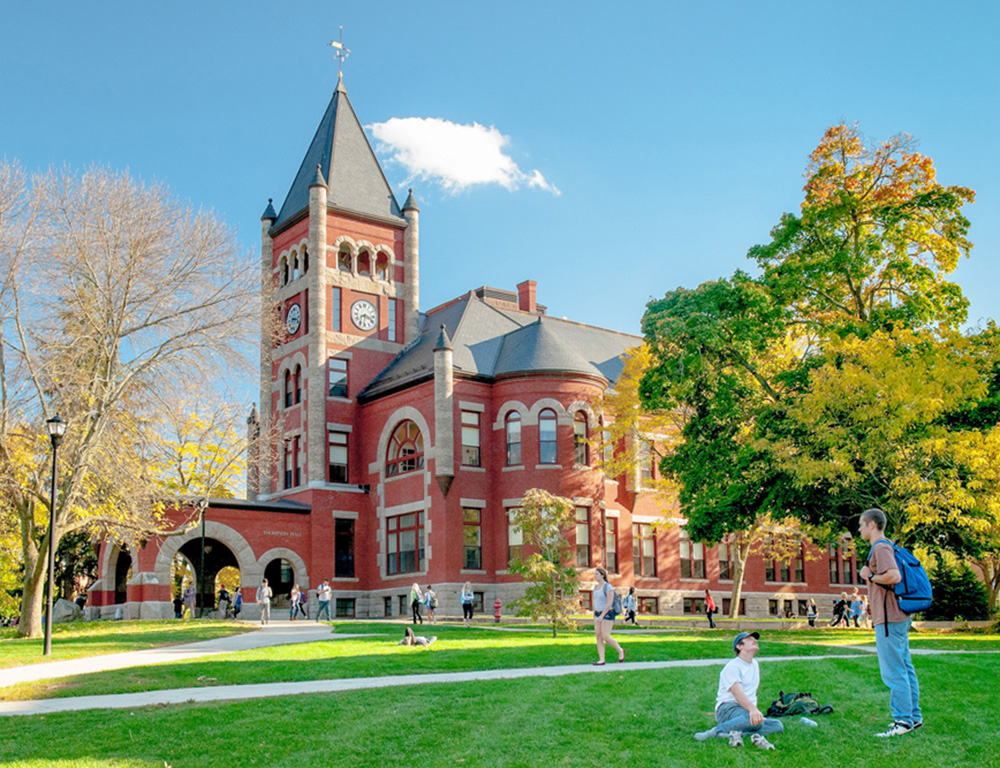Bioengineering Major (B.S.)
Bioengineering Major (B.S.)

What is a Bachelor of Science in bioengineering?
This program is tailored to students who want to use engineering principles to analyze problems and design solutions in the fields of healthcare, medicine and biology. It’s a truly interdisciplinary program, with courses in both the College of Engineering and Physical Sciences and the College of Life Sciences and Agriculture. Graduates from the bioengineering program solve problems at the interface of biology and engineering in the fields of biotechnology and pharmaceuticals, as well as medicine and biofuels.
Why study bioengineering at UNH?
You’ll gain a solid foundation of biology and engineering principles through challenging courses and hands-on learning opportunities in our state-of-the-art laboratories. Our faculty have a broad background in modeling physiological and biochemical processes, enzyme kinetics, synthetic biology, biomaterials and biosensor development and related topics such as tissue engineering. Electives let you adapt your program to prepare for medical school, other graduate studies or careers in biomanufacturing, biotechnology or biomedical engineering.
Potential careers
- Biofuels
- Bioinstrumentation
- Biomaterials
- Biomedical devices and equipment
- Biotechnology
- Cell and tissue engineering
- Pharmaceuticals and medicine
- Rehabilitation engineering
Contact
33 Academic Way
Kingsbury Hall, Room W301
University of New Hampshire
Durham, NH 03824
Phone: (603) 862-3654
Fax: (603) 862-3747
Curriculum & Requirements
The Bioengineering program is tailored to students who want to use engineering principles to analyze problems and design solutions in the fields of healthcare, medicine and biology, biotechnology and pharmaceuticals, as well as biofuels.
The bioengineering program is truly interdisciplinary and will train graduates in biology and physiology as well as engineering. The program will provide graduates with capabilities in advanced mathematics (including differential equations and statistics), science, and engineering. Graduates will be conversant with solving problems at the interface of biology and engineering that may arise in a variety of fields. By graduation, students will have experience measuring and interpreting data from living systems and addressing the interactions between living and non-living materials.
For more information on the bioengineering program, please contact Nivedita Gupta, Professor and Chair.
The Bioengineering program (B Sci in Bioengineering) is accredited by the Engineering Accreditation Commission of ABET, https://www.abet.org, under the General Criteria and the Program Criteria for Bioengineering and Biomedical and Similarly Named Engineering Programs.
| First Year | ||
|---|---|---|
| Fall | Credits | |
| CHBE 400 | Chemical and Bioengineering Lectures | 1 |
| CHEM 405 | Chemical Principles for Engineers 2 | 4 |
| ENGL 401 | First-Year Writing 3 | 4 |
| MATH 425 | Calculus I 1 | 4 |
| Discovery Program Elective | 4 | |
| Credits | 17 | |
| Spring | ||
| BIOL 411 | Introductory Biology: Molecular and Cellular 4 | 4 |
| MATH 426 | Calculus II | 4 |
| PHYS 407 | General Physics I | 4 |
| Discovery Program Elective | 4 | |
| Credits | 16 | |
| Second Year | ||
| Fall | ||
| CHBE 501 | Material Balances | 3 |
| CHEM 545 | Organic Chemistry | 3 |
| CHEM 546 | Organic Chemistry Laboratory | 2 |
| GEN 604 | Principles of Genetics | 4 |
| MATH 527 | Differential Equations with Linear Algebra | 4 |
| Credits | 16 | |
| Spring | ||
| BMS 503 | General Microbiology | 3 |
| BMS 504 | General Microbiology Laboratory | 2 |
| CHBE 502 | Energy Balances 5 | 3 |
| MATH 644 | Statistics for Engineers and Scientists | 4 |
| Discovery Program Elective | 4 | |
| Credits | 16 | |
| Third Year | ||
| Fall | ||
| BMCB 658 | General Biochemistry | 3 |
| BMCB 659 | General Biochemistry Lab | 2 |
| CHBE 601 | Fluid Mechanics and Unit Operations | 3 |
| CHBE 766 | Biomaterials | 4 |
| Bioengineering Program Elective | 4 | |
| Credits | 16 | |
| Spring | ||
| BMS 508 | Human Anatomy and Physiology II | 4 |
| CHBE 604 | Chemical Engineering Thermodynamics | 3 |
| CHBE 761 | Biochemical Engineering | 4 |
| Bioengineering Program Elective | 4 | |
| Credits | 15 | |
| Fourth Year | ||
| Fall | ||
| CHBE 762 | Biomedical Engineering | 4 |
| CHBE 763 | Bioengineering Design I | 2 |
| Bioengineering Program Electives (2) | 8 | |
| Discovery Program Elective | 4 | |
| Credits | 18 | |
| Spring | ||
| CHBE 614 | Separation Processes | 3 |
| CHBE 764 | Bioengineering Design II | 4 |
| Bioengineering Program Elective | 4 | |
| Discovery Program Elective | 4 | |
| Credits | 15 | |
| Total Credits | 129 | |
- 1
MATH 425 Calculus I satisfies the Discovery Foundation Quantitative Reasoning category.
- 2
CHEM 405 Chemical Principles for Engineers satisfies the Discovery Physical Science (with lab) category.
- 3
ENGL 401 First-Year Writing satisfies the Discovery Foundation Writing Skills category.
- 4
BIOL 411 Introductory Biology: Molecular and Cellular satisfies the Discovery Biological Science (with lab) category.
- 5
CHBE 502 Energy Balances satisfies the Discovery Inquiry category.
The Discovery ETS category requirement is met upon receiving a passing grade in CHBE 400 Chemical and Bioengineering Lectures; CHBE 761 Biochemical Engineering; CHBE 762 Biomedical Engineering; CHBE 763 Bioengineering Design I; CHBE 764 Bioengineering Design II. Students who do not complete these courses must take a Discovery ETS course to fulfill the requirement.
34 credits engineering, 16 credits math, 14 credits chemistry, 16 credits life science
Five electives: 12 to 16 credits engineering; 3 to 4 credits science, math, or engineering
Degree Requirements
All Major, Option and Elective Requirements as indicated.
*Major GPA requirements as indicated.
Major Requirements
Students are required to obtain a minimum 2.0 grade-point average in CHBE 501 Material Balances and CHBE 502 Energy Balances and in overall standing at the end of the sophomore year in order to continue in the major. Study abroad (Exchange) students are required to have a cumulative GPA of 3.0 or better in math, physics, chemistry, and other required courses at the end of the semester prior to their exchange semester.
| Code | Title | Credits |
|---|---|---|
| CHBE 400 | Chemical and Bioengineering Lectures | 1 |
| CHBE 501 | Material Balances | 3 |
| CHBE 502 | Energy Balances | 3 |
| CHBE 601 | Fluid Mechanics and Unit Operations | 3 |
| CHBE 604 | Chemical Engineering Thermodynamics | 3 |
| CHBE 614 | Separation Processes | 3 |
| CHBE 761 | Biochemical Engineering | 4 |
| CHBE 762 | Biomedical Engineering | 4 |
| CHBE 763 | Bioengineering Design I | 2 |
| CHBE 764 | Bioengineering Design II | 4 |
| CHBE 766 | Biomaterials | 4 |
| BIOL 411 | Introductory Biology: Molecular and Cellular | 4 |
| BMCB 658 & BMCB 659 | General Biochemistry and General Biochemistry Lab | 5 |
| BMS 503 | General Microbiology | 3 |
| BMS 504 | General Microbiology Laboratory | 2 |
| BMS 508 | Human Anatomy and Physiology II | 4 |
| CHEM 405 | Chemical Principles for Engineers | 4 |
| CHEM 545 & CHEM 546 | Organic Chemistry and Organic Chemistry Laboratory | 5 |
| GEN 604 | Principles of Genetics | 4 |
| MATH 425 | Calculus I | 4 |
| MATH 426 | Calculus II | 4 |
| MATH 527 | Differential Equations with Linear Algebra | 4 |
| MATH 644 | Statistics for Engineers and Scientists | 4 |
| PHYS 407 | General Physics I | 4 |
| Electives | ||
| Select five courses from the following: 1 | ||
BMCB 753 | Cell Culture | |
BMS 507 | Human Anatomy and Physiology I | |
BMS 702 | Endocrinology | |
BMS 704 | Pathologic Basis of Disease | |
BMS 706 & BMS 708 | Virology and Virology Laboratory | |
CEE 502 | Project Engineering 1 | |
CEE 705 | Introduction to Sustainable Engineering 1 | |
CEE 724 | Environmental Engineering Microbiology 1 | |
CHBE 602 | Heat Transfer and Unit Operations 1 | |
CHBE 603 | Applied Mathematics for Chemical Engineers 1 | |
CHBE 651 | Biotech Experience/Biomanufacturing 1 | |
CHBE 703 | Mass Transfer and Stagewise Operations 1 | |
CHBE 707 | Chemical Engineering Kinetics 1 | |
CHBE 709 | Fundamentals of Air Pollution and Its Control 1 | |
CHBE 712 | Introduction to Nuclear Engineering 1 | |
CHBE 714 | Chemical Sensors 1 | |
CHBE 722 | Introduction to Microfluidics 1 | |
CHBE 725 | Cell Phenotyping and Tissue Engineering Laboratory 1 | |
CHBE 752 | Process Dynamics and Control 1 | |
CHBE 755 | Computational Molecular Bioengineering 1 | |
ECE 537 | Introduction to Electrical Engineering 1 | |
ECE 541 | Electric Circuits 1 | |
ECE 543 | Introduction to Digital Systems 1 | |
ECE 633 | Signals and Systems I 1 | |
ECE 633H | Honors/Signals and Systems I 1 | |
ECE 717 | Introduction to Digital Image Processing 1 | |
ECE 784 | Biomedical Instrumentation 1 | |
GEN 711 | Genomics and Bioinformatics | |
or GEN 711W | Genomics and Bioinformatics | |
GEN 712 | Programming for Bioinformatics | |
GEN 717 | Molecular Microbiology | |
GEN 771 | Molecular Genetics | |
GEN 774 | Techniques in Plant Genetic Engineering and Biotechnology 1 | |
TECH 780 | Intellectual Property Law for Engineers & Scientists | |
| Total Credits | 85 | |
- 1
At least four of the elective courses must be engineering.
By the time of graduation, students will have:
- an ability to identify, formulate, and solve complex engineering problems by applying principles of engineering, science, and mathematics.
- an ability to apply engineering design to produce solutions that meet specified needs with consideration of public health, safety, and welfare, as well as global, cultural, social, environmental, and economic factors.
- an ability to communicate effectively with a range of audiences.
- an ability to recognize ethical and professional responsibilities in engineering situations and make informed judgments, which must consider the impact of engineering solutions in global, economic, environmental, and societal contexts.
- an ability to function effectively on a team whose members together provide leadership, create a collaborative and inclusive environment, establish goals, plan tasks, and meet objectives.
- an ability to develop and conduct appropriate experimentation, analyze and interpret data, and use engineering judgment to draw conclusions.
- an ability to acquire and apply new knowledge as needed, using appropriate learning strategies.
Explore Program Details
The bioengineering program seeks to provide an environment and opportunities that enable students to pursue their goals in an innovative program with a diversity of offerings that is rigorous and challenging.
















